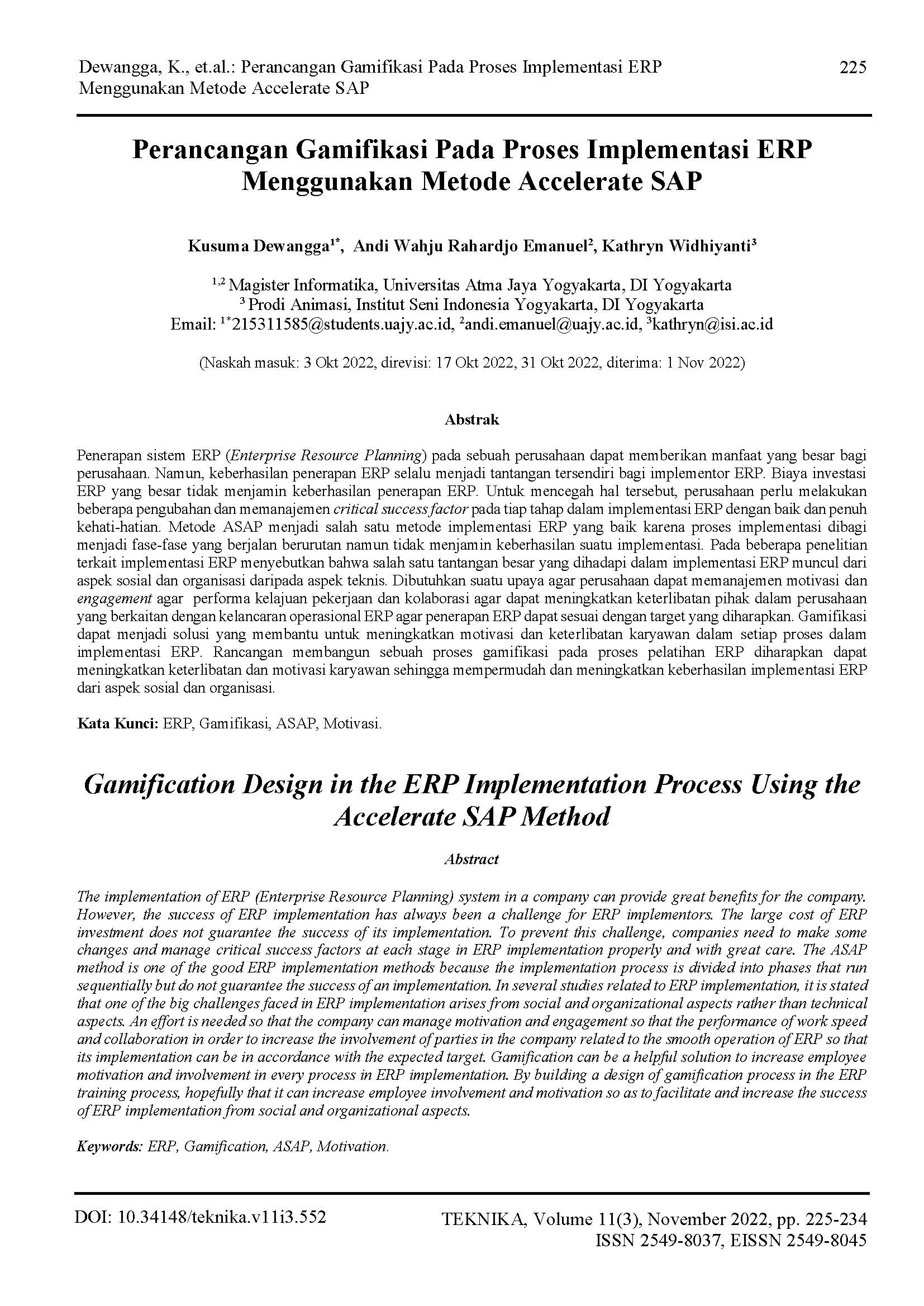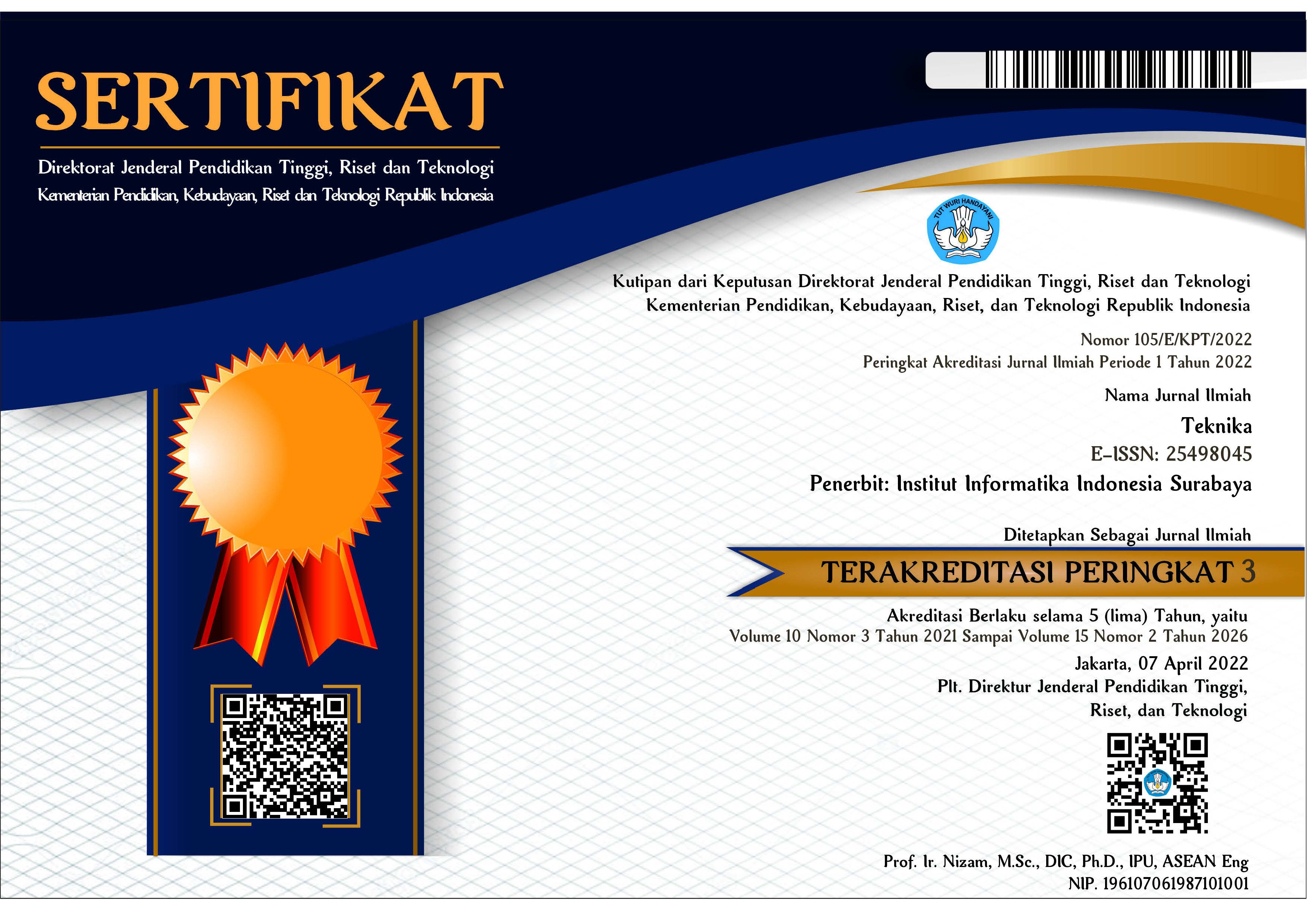Perancangan Gamifikasi Pada Proses Implementasi ERP Menggunakan Metode Accelerate SAP
DOI:
https://doi.org/10.34148/teknika.v11i3.552Keywords:
ERP, Gamifikasi, ASAP, MotivasiAbstract
Penerapan sistem ERP (Enterprise Resource Planning) pada sebuah perusahaan dapat memberikan manfaat yang besar bagi perusahaan. Namun, keberhasilan penerapan ERP selalu menjadi tantangan tersendiri bagi implementor ERP. Biaya investasi ERP yang besar tidak menjamin keberhasilan penerapan ERP. Untuk mencegah hal tersebut, perusahaan perlu melakukan beberapa pengubahan dan memanajemen critical success factor pada tiap tahap dalam implementasi ERP dengan baik dan penuh kehati-hatian. Metode ASAP menjadi salah satu metode implementasi ERP yang baik karena proses implementasi dibagi menjadi fase-fase yang berjalan berurutan namun tidak menjamin keberhasilan suatu implementasi. Pada beberapa penelitian terkait implementasi ERP menyebutkan bahwa salah satu tantangan besar yang dihadapi dalam implementasi ERP muncul dari aspek sosial dan organisasi daripada aspek teknis. Dibutuhkan suatu upaya agar perusahaan dapat memanajemen motivasi dan engagement agar performa kelajuan pekerjaan dan kolaborasi agar dapat meningkatkan keterlibatan pihak dalam perusahaan yang berkaitan dengan kelancaran operasional ERP agar penerapan ERP dapat sesuai dengan target yang diharapkan. Gamifikasi dapat menjadi solusi yang membantu untuk meningkatkan motivasi dan keterlibatan karyawan dalam setiap proses dalam implementasi ERP. Rancangan membangun sebuah proses gamifikasi pada proses pelatihan ERP diharapkan dapat meningkatkan keterlibatan dan motivasi karyawan sehingga mempermudah dan meningkatkan keberhasilan implementasi ERP dari aspek sosial dan organisasi.
Downloads
References
T. Hasan, “Impact of ERP System in Business Management,” International Journal of Management Studies, vol. V, no. 4(4), p. 24, Oct. 2018, doi: 10.18843/ijms/v5i4(4)/03.
J. P. Beardwood and P. Millar, “Failed ERP Implementation Case Study of MillerCoors v HCL,” Computer Law Review International, vol. 20, no. 5, pp. 136—142, Oct. 2019, doi: 10.9785/cri-2019-200503.
T. Ness and A. Meltzer-Asscher, “Lexical Inhibition Due to Failed Prediction: Behavioral Evidence and ERP Correlates.,” J Exp Psychol Learn Mem Cogn, vol. 44, no. 8, pp. 1269—1285, Aug. 2018, doi: 10.1037/xlm0000525.
M. M. Cruz-Cunha, Enterprise Information Systems for Business Integration in SMEs : Technological, Organizational, and Social Dimensions. Business Science Reference, 2010.
A. Basit, Z. Hassan, N. Omar, S. Sethu, S. Sethumadavan, and N. Z. Jhanjhi, “Gamification: A Tool To Enhance Employee Engagement And Performance,” 2021. [Online]. Available: https://www.researchgate.net/publication/353345446
R. S. Alsawaier, “The Effect of Gamification on Motivation and Engagement,” The International Journal of Information and Learning Technology, vol. 35, no. 1, pp. 56—79, Jan. 2018, doi: 10.1108/IJILT-02-2017-0009.
A. Pavlov, “Investigating the Effect of Gamification on a Software Engineering Company,” 2018. [Online]. Available: http://www.teknik.uu.se/student-en/
F. Herianty Akhzan and G. T. Pontoh, “The Impact of Human Critical Success Factor on ERP System Implementation.”
F. Mahar, S. I. Ali, A. K. Jumani, and M. O. Khan, “ERP System Implementation: Planning, Management, and Administrative Issues,” Indian J Sci Technol, vol. 13, no. 1, pp. 106—22, Jan. 2020, doi: 10.17485/ijst/2020/v13i01/148982.
R. Maulidina, N. A. Rizki, and R. S. Dewi, “Perencanaan dan Implementasi SAP Pada PT XYZ Dengan Menggunakan Metode Accelerated SAP (ASAP),” JURIKOM (Jurnal Riset Komputer), vol. 7, no. 1, p. 83, Feb. 2020, doi: 10.30865/jurikom.v7i1.1856.
S. Supriyono and S. Sutiah, “Improvement of Project Management Using Accelerated SAP Method in the Odoo ERP,” Proceedings of the 1st International Conference on Management, Business, Applied Science, Engineering and Sustainability Development, ICMASES 2019. 2020. doi: 10.4108/eai.3-8-2019.2290729.
A. Terminanto, A. N. Hidayanto, And B. Maulana, “Development, Configuration And Implementation Open Source ERP in Manufacturing Modul With Accelerated SAP Method ,” International Journal of Management, vol. 10, no. 3, Jun. 2019, doi: 10.34218/IJM.10.3.2019.009.
M. Topal and O. Karaca, “Gamification in E-Learning,” Emerging Trends, Techniques, and Tools for Massive Open Online Course (MOOC) Management. 2018, pp. 79—105. doi: 10.4018/978-1-5225-5011-2.ch004.
J. Kim and D. M. Castelli, “Effects of Gamification on Behavioral Change in Education: A Meta-Analysis,” Int J Environ Res Public Health, vol. 18, no. 7, p. 3550, Mar. 2021, doi: 10.3390/ijerph18073550.
J. Krath, L. Schürmann, and H. F. O. von Korflesch, “Revealing The Theoretical Basis of Gamification: a Systematic Review and Analysis of Theory in Research On Gamification, Serious Games And Game-Based Learning,” Comput Human Behav, vol. 125, p. 106963, Dec. 2021, doi: 10.1016/j.chb.2021.106963.
Y. Dai et al., “Game Dynamics of Emotion Evolution Based on The Moran Process,” Chaos: An Interdisciplinary Journal of Nonlinear Science, vol. 31, no. 3, p. 033153, Mar. 2021, doi: 10.1063/5.0033680.
I. Alcivar and A. G. Abad, “Design and Evaluation of A Gamified System for ERP Training,” Comput Human Behav, vol. 58, pp. 109—118, May 2016, doi: 10.1016/j.chb.2015.12.018.
F. M.-L. Rivera, J. Mora-Serrano, And E. Oñate, “Virtual Reality Stories For Construction Training Scenarios: The Case Of Social Distancing At The Construction Site,” WIT Transactions on The Built Environment. Nov. 2021, pp. 37—47. doi: 10.2495/BIM210041.
H. Smuts, R. Winter, A. Gerber, and A. van der Merwe, “‘Designing’ Design Science Research — A Taxonomy for Supporting Study Design Decisions,” The Transdisciplinary Reach of Design Science Research. 2022, pp. 483—495. doi: 10.1007/978-3-031-06516-3_36.
K. Peffers, T. Tuunanen, and B. Niehaves, “Design Science Research Genres: Introduction to the Special Issue on Exemplars and Criteria for Applicable Design Science Research,” European Journal of Information Systems, vol. 27, no. 2. Taylor and Francis Ltd., pp. 129—139, Mar. 04, 2018. doi: 10.1080/0960085X.2018.1458066.
J. Bragge and T. Tuunanen, “The Design Science Research Process : A Model For Producing And Presenting Information Systems Research.” 1st International Conference, DESRIST 2006 Proceedings. 2006, pp. 83-106.























